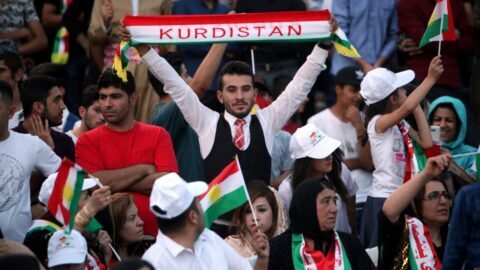By Arian Mufid:
In 2005, the KDP leader and president of KRG, issued a statement that, if civil war breaks out in Iraq, then we are going to ask for our Independence. Masud Barzani repeated the same message during an interview with the BBC in July 2014, saying he was ready to hold a referendum in the south of Kurdistan. Then ISIS started to attack South Kurdistan in August 2014 and, by Barzani’s own admission, Iran and especially the notorious General Qasim Sulaymani and his militia saved Erbil from collapsing and falling into the hands of ISIS. Throughout the ISIS War with Kurdish forces and Iraq forces, all the allied powers praised the sacrifices and resolve of the Kurds in their fight against ISIS. Many heads of state visited Erbil and declared solidarity with the Kurds and their plight, including then French president Francois Hollande. These messages were mistakenly taken by the KDP administration to mean that, if Kurds declared their independence, the western world would back them up. On 25th September 2017, the referendum was held and 92.73% voted in favor of Independence. However, because of this vote, the KRG has been punished. The Western world watched while Turkey stopped all flights to Kurdistan and Baghdad attacked Kirkuk with the help of the British, motivated by two UK companies searching for oil. The whole world was silent while the Kurds suffered. The KDP leadership failed to realise that the Western powers do not want an independent Kurdish state. Instead, they want the Kurds to remain stateless so they can be as a card by their friends in the Middle East whenever they want. I, for one, advocate the implementation of the referendum result, although this will not happen under the current KRG leadership. Nevertheless, for the first time, the aspiration, hopes and demands of millions of Kurdish votes was documented and it is beyond question that the Kurds need their own state like everywhere else. The KDP leadership once again failed to materialise Kurdish unity in their struggle for statehood.
In the 2015 UK General Election campaign, prime minister David Cameron pledged to hold a Brexit referendum by 2017 and that referendum, on whether to leave or remain in the EU, took place in June 2016. The whole idea of coming out of the European Union was advocated by narrow-minded British nationalists inside the Conservative Party, motivated by the ideas of British sovereignty and rule from London, not Brussels. The result of referendum came as a big blow to much of the UK establishment. 51.9% voted to leave and 48.1% voted to remain. Consequently, David Cameron resigned and the biggest challenge was left for others to accomplish. It is well known that two former UK prime ministers, Tony Blair and John Major, asked for a second referendum and in their joint statements basically called Brexit a disaster for whole of the UK and its history. Nevertheless, most people voting to leave were in England, whilst the north of Ireland, Scotland and Wales voted in favor of remaining in the EU. After a protracted series of negotiations with the EU leaders, the UK government managed to leave with an unfavorable deal. The effect of Brexit has been revealed as disastrous for the whole future of the UK. As a result, the United Kingdom has become the most Disunited Kingdom. The latest opinion polls show a majority of voters in Scotland and Northern Ireland want their own referendums on the breakup of the UK. As a result of Brexit, the sense of British identity that once bonded the country together is disintegrating. The point is that the UK was part of the EU since 1973 and suddenly UK politics has dismantled it all. The economic consequences are severe; to give just one example, Devon fisherman Ian Perkes told The Financial Times that, as a consequence of Brexit: “This time last January we had £850000 of export sales, this year – zero.”
Finally, the two referendums, one in the south of Kurdistan and the other in the UK, have some common ground and historical roots. They have both have left the two nations with the bad results and consequences which will influence the coming generations. The leadership of both referendums acted without foresight and it has struck me how poor planning and strategies reflect the decline of British Imperial Rule, which at one stage controlled almost the whole world and today has fallen into its biggest constitutional crisis.
.jpg)



